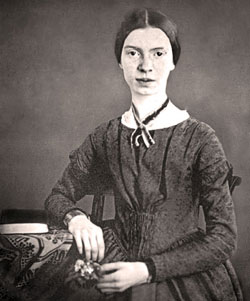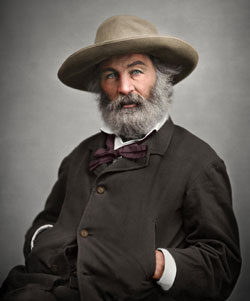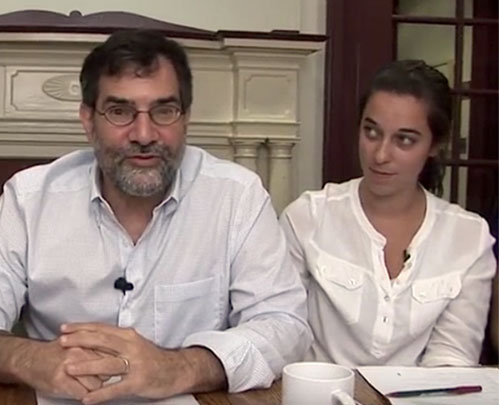|
Since 2012, University of Pennsylvania professor Al Filreis has been making a difference in teaching and
leading notably the uninitiated as well as the experienced poet into the world of poetry and, more specifically, modern and contemporary poetry. His massive open online course
(MOOC) from Coursera officially known as Modern & Contemporary American Poetry is affectionally called ModPo. The Steiny Road Poet has been engaged in or following this
community since it began. Over the years (this free course runs once a year every fall for ten weeks), ModPo has counted the enrollment of over 415,000 students from 179 countries.
 
Starting with Emily Dickinson and Walt Whitman—Filreis calls these American literary giants proto-modernists—the energetic professor
conducts live weekly broadcasts from the Kelly Writers House in Philadelphia with in-person teaching assistants and any peripatetic student who has the wherewithal to walk in.

Students have come in person from as far as Australia. By week four, Filreis and his attendants are close-reading Gertrude Stein.

While the course runs from September through November each year, the ModPo MOOC stays open year-round and allows students to continue
reading the curriculum and discussing individual poems with other students in the ModPo discussion forums.

In April 2022, Filreis and his former assistant Anna Strong Stafford are launching The Difference Is Spreading: Fifty Contemporary Poets on Fifty
Poems, their anthology of poems and essays based on the ModPo curriculum. The editors of this book say this is not a ModPo textbook or primer but another way to demonstrate community and relationships.
Filreis points to Cid Corman's poem with this line, "it isn't for want of something to say" to illustrate what Filreis hopes to achieve. He wants to
pique a reader's interest in poetry and "detain" that person so that he or she will stop and spend the time it takes to appreciate poetry.
The anthology opens with Walt Whitman's canto 11 from "Song of Myself" (1855) and ends with Evie Shockley's "a one-act play" (2017). Some of the
discussants also have their own poems under review. For example: Rae Armantrout discusses "The Brain—is Wider than the Sky" (1862) by Emily
Dickinson, while Elizabeth Willis discusses Armantrout's poem "The Way" (2001). Laynie Browne discusses Bernadette Mayer's "Invasion of the
Body Snatchers" (1976) and reciprocally, Bernadette Mayer discusses Laynie Browne's "Sonnet 123" (2007). Charles Bernstein discusses an
excerpt from Lyn Hejinian's poem "My Life", Hejinian discusses Lydia Davis' "A Mown Lawn" (2001), and Imaad Majeed discusses Bernstein's "In a Restless World Like This Is" (2006).
But not every poet included in the ModPo curriculum and who serves as a discussant also has his/her ModPo poem discussed. For example, Ron
Silliman whose poem "BART" is found in the ModPo Plus curriculum authors the third essay of the anthology on Gertrude Stein's "A Carafe, That
Is a Blind Glass." (1914). This is a place of honor—the third essay—because here Filreis is strategically serving up Gertrude Stein after Whitman and
Dickinson. Stein's work is Filreis' gateway to the experimental poets that stump so many readers. Less anyone fear the claustrophobia of poetry that
requires too much brain power or license to suspend expected norms, the fourth poem discussed by Bob Perelman is Robert Frost's "Mending Wall" (1914).
Here's a taste of what is in some of these essays.
Rob Fitterman on Mina Loy's "The Song of the Nightingale Is Like the Scent of Syringa" asserts that Loy's sound poem gives way to the "good
trouble" of "historical tragedy and subtle references to sensory perception tied to that tragedy." The tragedy is the rape of Nanking by the Japanese.
Three words—Nanking, syringa, and myringa—"triangulate the meaning." Here are the first four lines:
Nightingale singing—gale of Nanking
Sing—mystery
of Ming-dynasty
sing
In Charles Bernstein's "In a Restless World Like This Is," Imaad Majeed creates a counterpoint to the discussion Rob Fitterman offers in writing
about "The Song of the Nightingale Is Like the Scent of Syringa". Both poems have an historical element and a strong sense of sound. Majeed
notes that the title of Bernstein's poem comes from the song "When I Fall in Love". The song was released April 1952 when the Allied occupation of
Japan ended. Majeed suggests that Bernstein's poem, along with others that have musically inspired Bernstein titles, doesn't address history but
exists in history. This is important to Majeed who comes from the politically turbulent country of Sri Lanka. Seeing what Bernstein did with
his poem gives Majeed confidence that he can be part of the history of his country without being swallowed by its turmoil. Possibly this recognition
allows Majeed to speak about Bernstein's craft—a modern sonnet of 14 lines with a volta but no rhyme scheme—without being carried away with
its political implications. Majeed states:
"There is a sense of the dissolving, the dreaming, and the breaking, of which the poem speaks. This comes across in how the poem is constructed.
There is work to be done by the reader to bring out the meaning of the text. This is to be expected of a Language poet."
Majeed's approach seems to reach out to the reader in an intimate and
congenial way that feels inclusive. It also meets the editors' goals of gently detaining the reader, especially when the work requires more effort as
Language poetry does. Here are the first five lines of Bernstein's poem:
Not long ago, or maybe I dreamt it
Or made it up, or have suddenly lost
Track of its train in the hocus pocus
Of the dissolving days; no, if I bend
The turn around the corner, come at it
Not all the poems included in this anthology require extra hard work to enter and appreciate—such poems as Claude McKay's "If We Must Die"
(1919), Allen Ginsberg's "A Supermarket in California" (1955), Langston Hughes' "Dinner Guest: Me" (1965), Caroline Bergvall's "VIA" (2003).
But don't stumble blindly into these essays without a little bounce in your knees. Knowing we've entered a double indemnityof the absurd while
reading the first paragraph of Bernadette Mayer's essay on Laynie Browne's "Sonnet 123", we start scratching our heads when the first
sentence announces that some sonnets have more than 14 lines. Furtively we count and recount the number of lines in "Sonnet 123", and it has
exactly 14 lines. After listing the last and first words of each line, Mayer asserts that she doesn't like punctuation or capitals. Browne is light on
punctuation—she uses only one comma in this sonnet but there are plenty of capitals most suggesting a sentence beginning.Is Mayer chiding Browne
or just writing a response poem disguised as an essay? Lighten up and laugh seems to be the message. Here are the first three lines of Browne's poem:
In Chinese astrology you are a snake
but at home you are a kitty-knight
You don't have any bunny in your body
Here's a random sentence from Mayer's "essay":
"And then, before the imitation Noguchi lamp, a frog flew out of the dictionary and leapt over to me and Laynie, who happened to be visiting at
the time and we both thought: that dictionary's acting weird, but then we remembered that the dictionary had made love to another (etymological)
dictionary and this was their offspring, we named it bunny."
Anthologies tend to provide resources that one digests slowly over a long
period of time. The ModPo course is like this, and it isn't surprising that The Difference Is Spreading features essays that require copious down
time for rumination. The Steiny Road Poet highly recommends this book with its unique and intriguing approach to modern poetry.
|